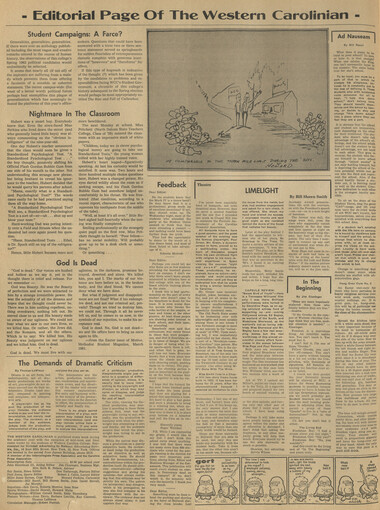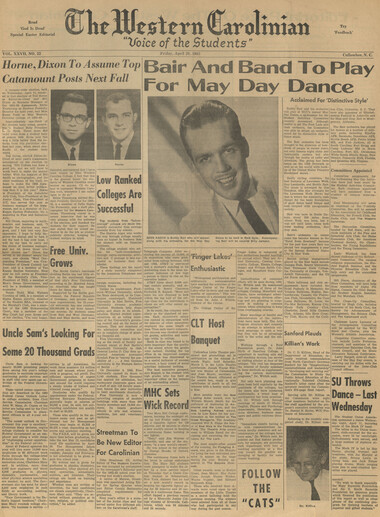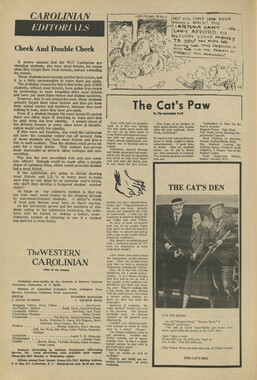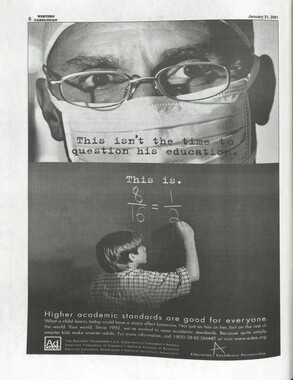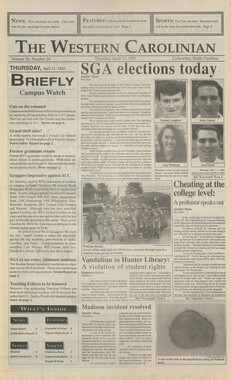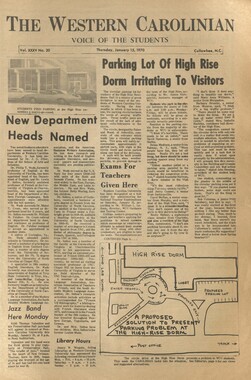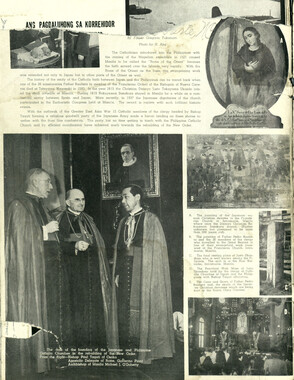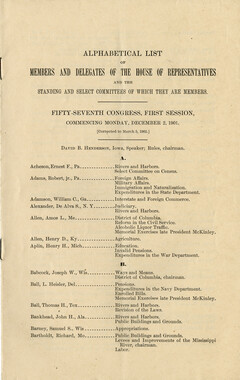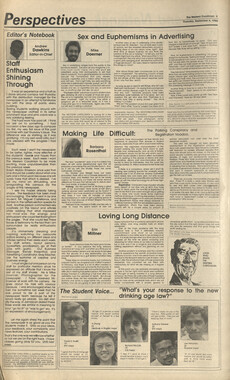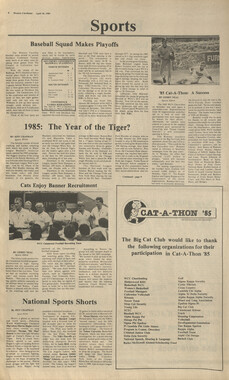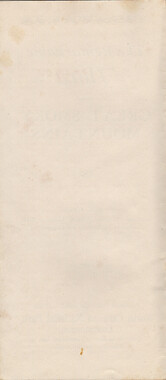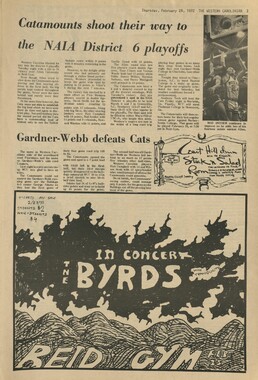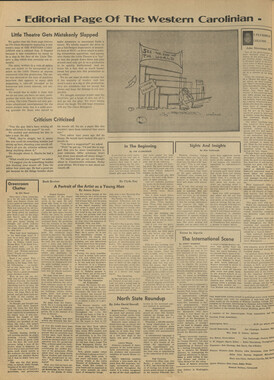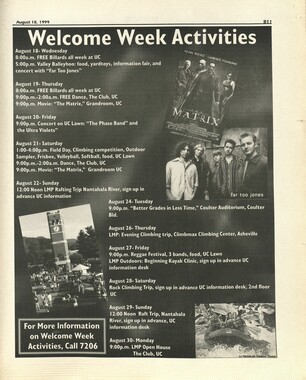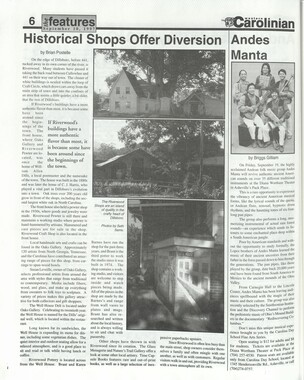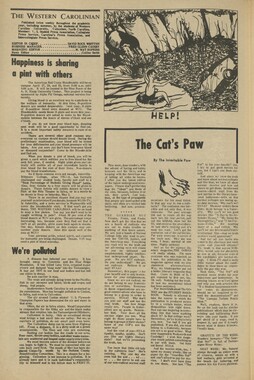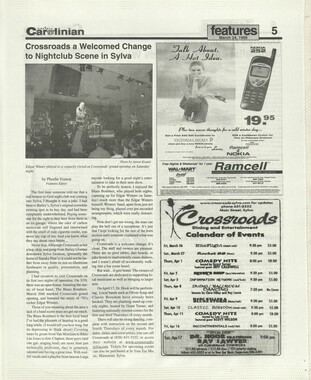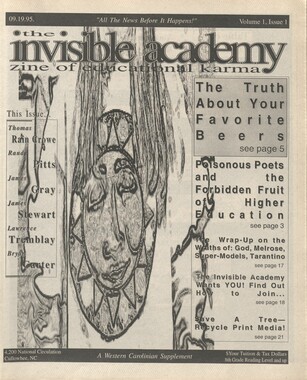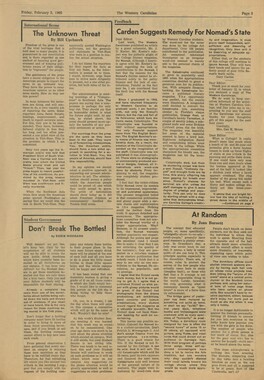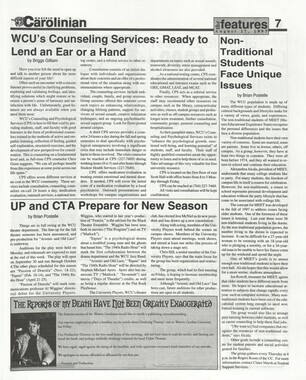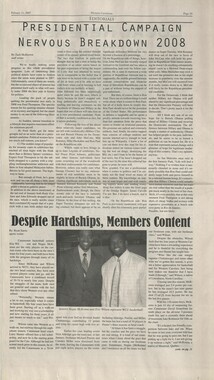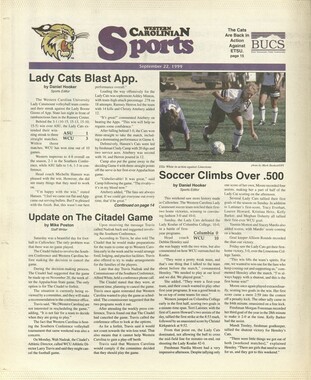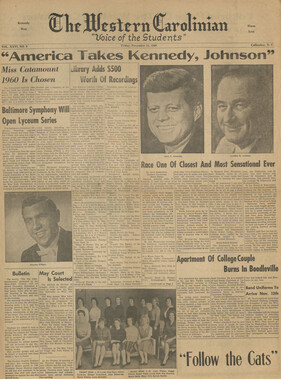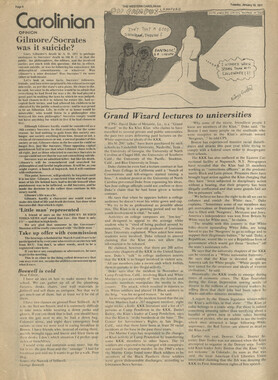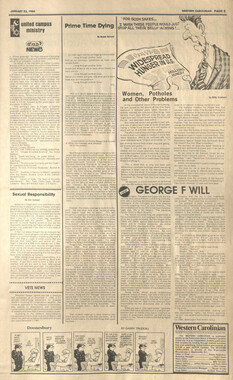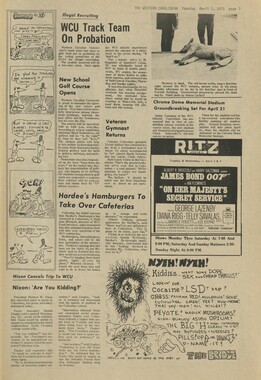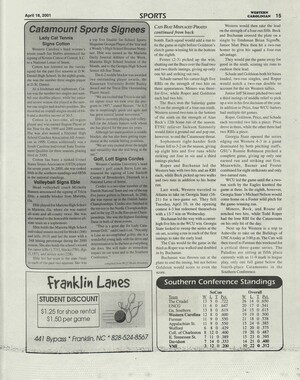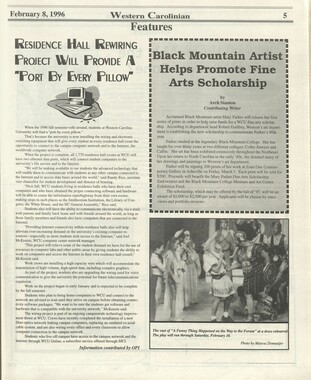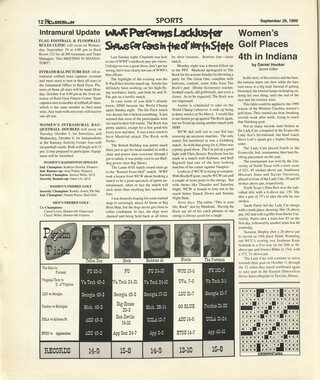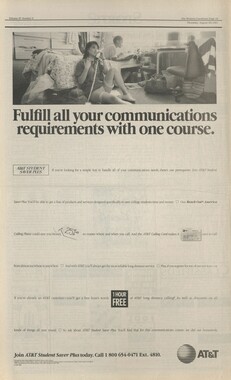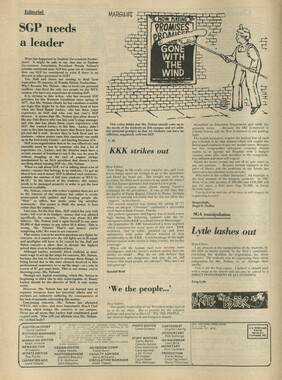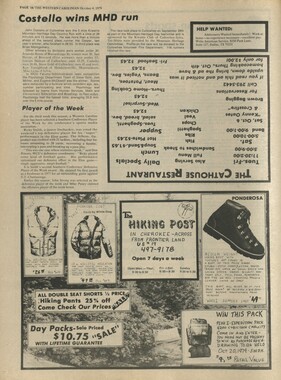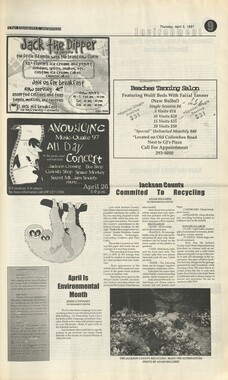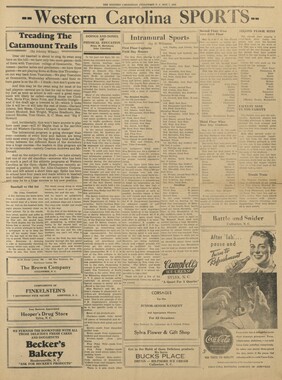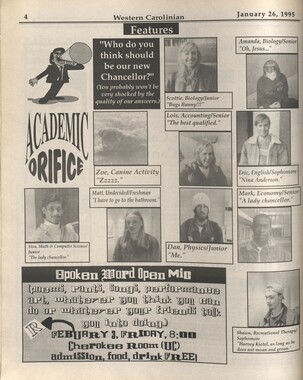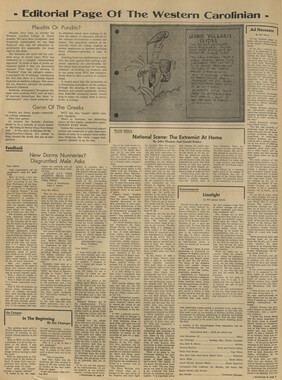Western Carolina University (20)
View all
- Canton Champion Fibre Company (2308)
- Cherokee Traditions (291)
- Civil War in Southern Appalachia (165)
- Craft Revival (1942)
- Great Smoky Mountains - A Park for America (2946)
- Highlights from Western Carolina University (430)
- Horace Kephart (941)
- Journeys Through Jackson (159)
- LGBTQIA+ Archive of Jackson County (85)
- Oral Histories of Western North Carolina (314)
- Picturing Appalachia (6798)
- Stories of Mountain Folk (413)
- Travel Western North Carolina (160)
- Western Carolina University Fine Art Museum Vitreograph Collection (129)
- Western Carolina University Herbarium (92)
- Western Carolina University: Making Memories (708)
- Western Carolina University Publications (2412)
- Western Carolina University Restricted Electronic Theses and Dissertations (146)
- Western North Carolina Regional Maps (71)
- World War II in Southern Appalachia (131)
University of North Carolina Asheville (6)
View all
- Allanstand Cottage Industries (62)
- Appalachian National Park Association (53)
- Bennett, Kelly, 1890-1974 (1388)
- Berry, Walter (76)
- Brasstown Carvers (40)
- Carver, George Washington, 1864?-1943 (26)
- Cathey, Joseph, 1803-1874 (1)
- Champion Fibre Company (233)
- Champion Paper and Fibre Company (297)
- Cherokee Indian Fair Association (16)
- Cherokee Language Program (22)
- Crowe, Amanda (40)
- Edmonston, Thomas Benton, 1842-1907 (7)
- Ensley, A. L. (Abraham Lincoln), 1865-1948 (275)
- Fromer, Irving Rhodes, 1913-1994 (70)
- George Butz (BFS 1907) (46)
- Goodrich, Frances Louisa (120)
- Grant, George Alexander, 1891-1964 (96)
- Heard, Marian Gladys (60)
- Kephart, Calvin, 1883-1969 (15)
- Kephart, Horace, 1862-1931 (313)
- Kephart, Laura, 1862-1954 (39)
- Laney, Gideon Thomas, 1889-1976 (439)
- Masa, George, 1881-1933 (61)
- McElhinney, William Julian, 1896-1953 (44)
- Niggli, Josephina, 1910-1983 (10)
- North Carolina Park Commission (105)
- Osborne, Kezia Stradley (9)
- Owens, Samuel Robert, 1918-1995 (11)
- Penland Weavers and Potters (36)
- Roberts, Vivienne (15)
- Roth, Albert, 1890-1974 (142)
- Schenck, Carl Alwin, 1868-1955 (1)
- Sherrill's Photography Studio (2565)
- Southern Highland Handicraft Guild (127)
- Southern Highlanders, Inc. (71)
- Stalcup, Jesse Bryson (46)
- Stearns, I. K. (213)
- Thompson, James Edward, 1880-1976 (226)
- United States. Indian Arts and Crafts Board (130)
- USFS (683)
- Vance, Zebulon Baird, 1830-1894 (1)
- Weaver, Zebulon, 1872-1948 (58)
- Western Carolina College (230)
- Western Carolina Teachers College (282)
- Western Carolina University (1899)
- Western Carolina University. Mountain Heritage Center (18)
- Whitman, Walt, 1819-1892 (10)
- Wilburn, Hiram Coleman, 1880-1967 (73)
- Williams, Isadora (3)
- Cain, Doreyl Ammons (0)
- Crittenden, Lorraine (0)
- Rhodes, Judy (0)
- Smith, Edward Clark (0)
- Appalachian Region, Southern (2569)
- Asheville (N.C.) (1923)
- Avery County (N.C.) (26)
- Blount County (Tenn.) (195)
- Buncombe County (N.C.) (1672)
- Cherokee County (N.C.) (283)
- Clay County (N.C.) (555)
- Graham County (N.C.) (233)
- Great Smoky Mountains National Park (N.C. and Tenn.) (519)
- Haywood County (N.C.) (3569)
- Henderson County (N.C.) (70)
- Jackson County (N.C.) (4804)
- Knox County (Tenn.) (35)
- Knoxville (Tenn.) (13)
- Lake Santeetlah (N.C.) (10)
- Macon County (N.C.) (420)
- Madison County (N.C.) (215)
- McDowell County (N.C.) (39)
- Mitchell County (N.C.) (132)
- Polk County (N.C.) (35)
- Qualla Boundary (981)
- Rutherford County (N.C.) (76)
- Swain County (N.C.) (2135)
- Transylvania County (N.C.) (270)
- Watauga County (N.C.) (12)
- Waynesville (N.C.) (86)
- Yancey County (N.C.) (72)
- Aerial Photographs (3)
- Aerial Views (60)
- Albums (books) (4)
- Articles (1)
- Artifacts (object Genre) (228)
- Bibliographies (1)
- Biography (general Genre) (2)
- Cards (information Artifacts) (38)
- Clippings (information Artifacts) (191)
- Copybooks (instructional Materials) (3)
- Crafts (art Genres) (622)
- Depictions (visual Works) (21)
- Design Drawings (1)
- Drawings (visual Works) (185)
- Envelopes (73)
- Exhibitions (events) (1)
- Facsimiles (reproductions) (1)
- Fiction (general Genre) (4)
- Financial Records (12)
- Fliers (printed Matter) (67)
- Glass Plate Negatives (381)
- Guidebooks (2)
- Internegatives (10)
- Interviews (815)
- Land Surveys (102)
- Letters (correspondence) (1013)
- Manuscripts (documents) (618)
- Maps (documents) (177)
- Memorandums (25)
- Minutes (administrative Records) (59)
- Negatives (photographs) (6015)
- Newsletters (1290)
- Newspapers (2)
- Notebooks (8)
- Occupation Currency (1)
- Paintings (visual Works) (1)
- Pen And Ink Drawings (1)
- Periodicals (193)
- Personal Narratives (10)
- Photographs (12976)
- Plans (maps) (1)
- Poetry (5)
- Portraits (4539)
- Postcards (329)
- Programs (documents) (151)
- Publications (documents) (2364)
- Questionnaires (65)
- Relief Prints (26)
- Sayings (literary Genre) (1)
- Scrapbooks (282)
- Sheet Music (2)
- Slides (photographs) (402)
- Songs (musical Compositions) (2)
- Sound Recordings (796)
- Specimens (92)
- Speeches (documents) (15)
- Tintypes (photographs) (8)
- Transcripts (322)
- Video Recordings (physical Artifacts) (23)
- Text Messages (0)
- A.L. Ensley Collection (275)
- Appalachian Industrial School Records (7)
- Appalachian National Park Association Records (336)
- Axley-Meroney Collection (2)
- Bayard Wootten Photograph Collection (20)
- Bethel Rural Community Organization Collection (7)
- Blumer Collection (5)
- C.W. Slagle Collection (20)
- Canton Area Historical Museum (2110)
- Carlos C. Campbell Collection (462)
- Cataloochee History Project (64)
- Cherokee Studies Collection (4)
- Daisy Dame Photograph Album (5)
- Daniel Boone VI Collection (1)
- Doris Ulmann Photograph Collection (112)
- Elizabeth H. Lasley Collection (1)
- Elizabeth Woolworth Szold Fleharty Collection (4)
- Frank Fry Collection (95)
- George Masa Collection (173)
- Gideon Laney Collection (452)
- Hazel Scarborough Collection (2)
- Hiram C. Wilburn Papers (28)
- Historic Photographs Collection (236)
- Horace Kephart Collection (861)
- Humbard Collection (33)
- Hunter and Weaver Families Collection (1)
- I. D. Blumenthal Collection (4)
- Isadora Williams Collection (4)
- Jesse Bryson Stalcup Collection (47)
- Jim Thompson Collection (224)
- John B. Battle Collection (7)
- John C. Campbell Folk School Records (80)
- John Parris Collection (6)
- Judaculla Rock project (2)
- Kelly Bennett Collection (1407)
- Love Family Papers (11)
- Major Wiley Parris Civil War Letters (3)
- Map Collection (12)
- McFee-Misemer Civil War Letters (34)
- Mountain Heritage Center Collection (4)
- Norburn - Robertson - Thomson Families Collection (44)
- Pauline Hood Collection (7)
- Pre-Guild Collection (2)
- Qualla Arts and Crafts Mutual Collection (12)
- R.A. Romanes Collection (681)
- Rosser H. Taylor Collection (1)
- Samuel Robert Owens Collection (94)
- Sara Madison Collection (144)
- Sherrill Studio Photo Collection (2558)
- Smoky Mountains Hiking Club Collection (616)
- Stories of Mountain Folk - Radio Programs (374)
- The Reporter, Western Carolina University (510)
- Venoy and Elizabeth Reed Collection (16)
- WCU Gender and Sexuality Oral History Project (32)
- WCU Mountain Heritage Center Oral Histories (25)
- WCU Oral History Collection - Mountain People, Mountain Lives (71)
- WCU Students Newspapers Collection (1843)
- Western North Carolina Tomorrow Black Oral History Project (69)
- William Williams Stringfield Collection (2)
- Zebulon Weaver Collection (109)
- African Americans (390)
- Appalachian Trail (35)
- Artisans (521)
- Cherokee art (84)
- Cherokee artists -- North Carolina (10)
- Cherokee language (21)
- Cherokee pottery (101)
- Cherokee women (208)
- Church buildings (172)
- Civilian Conservation Corps (U.S.) (111)
- College student newspapers and periodicals (1933)
- Dams (107)
- Dance (1023)
- Education (222)
- Floods (61)
- Folk music (1015)
- Forced removal, 1813-1903 (2)
- Forest conservation (220)
- Forests and forestry (1184)
- Gender nonconformity (4)
- Great Smoky Mountains National Park (N.C. and Tenn.) (181)
- Hunting (45)
- Landscape photography (25)
- Logging (119)
- Maps (83)
- Mines and mineral resources (8)
- North Carolina -- Maps (18)
- Paper industry (38)
- Postcards (255)
- Pottery (135)
- Railroad trains (72)
- Rural electrification -- North Carolina, Western (3)
- School integration -- Southern States (2)
- Segregation -- North Carolina, Western (5)
- Slavery (5)
- Sports (452)
- Storytelling (243)
- Waterfalls -- Great Smoky Mountains (N.C. and Tenn.) (66)
- Weaving -- Appalachian Region, Southern (280)
- Wood-carving -- Appalachian Region, Southern (328)
- World War, 1939-1945 (173)
Western Carolinian Volume 27 Number 22
Item
Item’s are ‘child’ level descriptions to ‘parent’ objects, (e.g. one page of a whole book).
-
-
- Editorial Page Of The Western Carolinian - Student Campaigns: A Farce? ■ p Generalities, generalities, generalities. If there were ever an anthology published including the most vague and evasive remarks uttered in the course of human history, the observations of this college's Spring 1962 political candidates would undoubtedly be selected. It seems that nearly all (if not all) of the aspirants are suffering from a malady which prevents them from offering a facsimile of a sensible or coherent statement. The recent campus-wide (for want of a better word) political forum perhaps best exemplifies this plague of generalization which has seemingly infested the platforms of this year's office- seekers. Questions that could have been answered with a terse two or three sentence statement served as springboards for sudden flourishes of extemporaneous rhetoric complete with generous insertions of "howevers" and "therefores" for effect. If this type of hogwash is indicative of the thought (?) which has been given by the candidates to problems and responsibilities facing WCC's Student Government, a chronicle of this college's history subsequent to the Spring election would perhaps be most appropriately entitled The Rise and Fall of Cullowhee. Nightmare In The Classroom Hubert was a smart boy. Everybody knew that. Even the stern-faced Miss Perkins who lived down the street (and who generally hated little boys) was always commenting on the "obvious intelligence" of the nine-year-old. One day Hubert's teacher announced that the class would soon be given a Standardized Psychological Test. "A Standardized Pyschological Test . . ." the boy thought, pensively shifting his Official Flash Gordon Bubble Gum from one side of his mouth to the other. Not understanding this strange new phrase, but being hesitant to reveal his ignorance to the teacher, Hubert decided that he would query his parents after school. "Mama, exactly what is a Standardized Psychological Test?" The words came easily for he had practiced saying them all the way home. "A Standardized Psychological Test? Well son, a Standardized Psychological Test is a sort of—er—uh .. . shut up and blow your nose." Hard-working Dad was poring intently over a Field and Stream when the undaunted lad once again posed his question. "Hmm, Standardized Tests . . . Ethel, is Dr. Spock still on top of the refrigerator?" Hence, little Hubert became more and more bewildered. The next Monday at school, Miss Pritchett (North Dakota State Teachers College, Class of '59) entered the class room with an impressive stack of white papers. "Children, today we (a clever psychological move) are going to take our Standardized Tests," the young woman trilled with her highly trained voice. Hubert's heart leaped—figuratively speaking. At last his curiosity would be satisfied. It soon was. Two hours and three hundred multiple choice questions later, Hubert was a changed person. His eyes darted wildly about the room as if seeking escape, and his Flash Gordon Bubble Gum had somehow lodged uncomfortably in his throat. He was frustrated (that condition, according to a recent report, characteristic of one who squeezes his toothpaste from the middle of the tube). "Well, at least it's all over," little Hubert sighed half-heartedly when the test ing was finally completed. Smiling professionally at the strangely quiet pupil on the first row, Miss Pritchett thought to herself: "Poor fellow— has no social mobility. Will probably grow up to be a desk clerk or something." Or something . . . God Is Dead "God is dead." Our voices are hushed and hollow as we say it, yet in the thought there is relief and release. For we remember — God was Beauty. He was the Beauty of perfection and we were attracted to him by a strange irresistible power. He was the actuality of all the dreams and hopes that we thought could never be. There was in him nothing repellent, nothing overdrawn, nothing left out. He moved close to us and His beauty made us aware of our ugliness. We could not bear what we saw in our own lives, so we killed him. Or rather, the Jews did, and the Romans, and all the others. Which is to say: We killed him. His Beauty was judgment on our ugliness and we killed him. God is dead. * * • God is dead. We must live with our ugliness, in the darkness, promises betrayed, deserted and alone. We killed him, you and I. The marks of our violence are here before us, in the broken body, and the shed blood. We cannot deny what we have done. But what if judgment and disappointment are not final? What if his redemptive deed, and not our criminal act, prevails? Though we tried to destroy him, we could not. Through it all he never left us, and he comes to us now, in the symbols of our rejection, to make his acceptance real. God is dead. No, God is not dead— we are! He offers here to bring us once again to life. —from the Easter issue of Motive, Methodist Student Magazine, March 1961. The Demands of Dramatic Criticism By Thomas LeMieux Drama is an art form, but unfortunately, not all dramatic productions are works of art; playwrights do not always succeed nor do their interpreters. Drama (and music), compared to painting and sculpture, are interpretive arts. A playwright has as his goal the production of the play; likewise, the audience wishes to see and hear the interpretation, not merely read the play. The reviewer, as a member of the audience, judges both the production, interpretation of the play, and analyzes the play per se. The interpreters are: the actors, production technicians, construction and maintenance crews, and the director (if the reader will excuse this cursory explanation). For unity and harmony within the totality of the production one relies on the director; in effect, the interpretation is initially and finally his. There is no single sacred interpretation of a play; each patron may indeed have his own interpretation (and one may include critics here a- mong patrons). If one were to analyze the interpretations THE WESTERN CAROLINIAN is published every week during the academic year with the exception of mid-term and final exam weeks by the students of Western Carolina College. Represented for National Advertising by National Advertising Service, Ins., 18 East 50th Street, New York, 22, New York. Offices are located in the second floor Joyner Building, phone 2312. A member of the Intercollegiate Press Association and the Carolina Press Association. Subscription Rate $2.00 per school year John Streetman III, Acting Editor Jim Cloninger, Business Mgr. Mrs. Ruth K. Nelson, Advisor Roy Bemis, News Editor Don Yarbrough, Feature Editor Paul Jones, Sports Editor Robert J. Cable, Layout Editor Billie Jeans Barnes, Copy Editor Howard Perkins, Cartoonist Columnists—Bill Raoul, Bill Shawn Smith, John David Stovall, Jac Murphy. Reporters—Bob Davis, Roberta Morrow, Issac Rose Sports Writers—David Howell, Howard White Photographers—William Gerald Smith, Eddy Thornburg Feature Writers—Joan Davis, Barbara Linville, Kay Carswell, Thomas LeMieux Circulation Manager—Robert Parrish. of a particular production, disagreements might just resolve to a question of differences of opinion. Hence, it is usually best to leave Interpreting to the playwright and director, on which they may agree or disagree, and Judge the resulting interpretation for and of itself. The critic, viewing the finished production, may analyze it acording to these three criteria: first, what was the playwright trying to say; secondly, was the production in harmony with what the playwright was attempting to say; and thirdly, did the audience receive that which the playwright was trying to say in the production. While the patron may discuss a production on a purely subjective basis, the reviewer must judge the production on an objective as well as subjective basis. He should look for inconsistencies, i.e., contradictions within the production itself. He should criticize constructively—offering suggestions and giving his opinions—but always realizing that this criticism may be strictly his own. The patron (or interpreter) may disagree, which is his prerogative; he may also find company in his disagreement with the reviewer. The reviewer does not always stand alone; it just appears that way. I /7? &OMFM*tA&fL$; ?& TM1£ Tr^SflBc Feedback Dear Editor: Do the studtnts know that the Mark IV is a dance band? Do they know that it is a professional group made up of excellent musicians? If not, they should wake up. On Wednesday night, most of the students who attended the party at the Student Union seemed to think that they were attending a concert — and nothing could have been further from the truth. They had the opportunity to dance to the music of a fine dance band, and most of them failed to take advantage of it. Roberta Morrow Dear Editor, Perhaps you could tell me why there are so few students attending the baseball games here on campus. I don't see why there aren't more people interested in athletics here at this college with one of the finest athletic training places in the state. I think this is bad sportsmanship on the part of every student who doesn't come to the bleachers to shout for the team. It is even worse than the person who throws the coke bottles at the umpire, or boos and hisses at the other players. At least these people are showing some interest in their school, and their team, by attending. Somebody once said that enthusiasm was rarely found in times that were prosperous, and that it flourishes only in times of danger. We axe in danger of losing what little sports-spirit there is left, and when that is gone, we will lose our team. Everyone knows that a team plays best when the stands are filled with cheering people, pushing them on to victory. The player in the cheering section is just as important as the player on the field, because they work together to win the victory. I hope that the turnout for the next home baseball game will make the team proud that they are playing for a school that appreciates a team. It's hard to play a bad game and such a pleasure to bring in a winning one, when appreciation is shown, and the best way to show it is to place your bottom on a bleacher and yell the Cats on to victory. Sincerely yours, Roger Whitiker P.S. While I am expressing my gripes, I would like to say that I don't think this school cares about anything. I was told that there were not many more than 600 students who voted for the people running in the election for some very important positions, among them, Editor and Business Manager of the Catamount. This publication will reach every student on campus. Is Democracy dead on this campus? If we don't watch it, the minority will rule the majority. I thank you very much. Theatre I've never been especially fond of banquets, not even theatrical ones. However, they do serve a needed function and the one that I attended last week in Chapel Hill was to celebrate the Fortieth Anniversary of the Carolina Dramatic Association. All banquets have to have a guest speaker, and the guest speaker of the evening was the famous playwright, Paul Green. Mr. Green, a dynamic person in form, proved to be a spellbinding orator. His topic of discussion ranged from his own childhood fight with religion to his more recent experience in Spain viewing the nouveau "sight and sound" productions. These productions, he explained, have no action—only sounds and multi-coloured illumination—and yet they so enthralled him that he wants to bring a similar technique to Carolina. Mr. Green uses incorrect English, jokes, becomes earthy, and yet all seems to be in keeping with his completely sincere unaffectedness. I no longer dislike banquets, especially theatrical ones. The Old North State seems to be brimming over with playwrights and most notable among these is one whom I was fortunate enough to meet on my sojourn to the "cultural oasis" of UNC. Upon meeting her, I was immediately captivated by her charm. She is sort of a "Brooklyn-come- to-Carolina" type person. She is Betty Smith. She is the au- thuress of A Tree Grows In Brooklyn, one of the only two books of fiction to have made the top 10 best seller list of the Twentieth Century in our country (the other being M- M's Gone With The Wind. Miss Smith lives in a Chapel Hill two-story frame house built in 1822. It has been her home for 25 years. After the aforementioned banquet I received an invitation to view Wednesday, I lost one of my shoes, and haven't been able to find it yet. If this keeps up, the only answer that I can see is to remove the table that finds so many conversations of the nine and one half minute type, and therefore clear the hall so that a movable passageway of more than one body width would be formed. There are three stairwells in Stillwell that are able to be used, but only this one holds any popularity with the student body. Take it from me, that the other two aren't in too much use, because aft- LIMELIGHT the house from the inside, but alas, had another engagement and asked for a rain check. It was offered. She shook my hand and wished me success. I expressed thanks and said good night as she vanished behind the doors of the house that radiates her beauty. Later at the play festival I had the opportunity to witness one of her plays, So Gracious Is The Time. To quote a certain advisor of our fair newspaper, "I was impressed." The play, set in Miss Smith's native Brooklyn, echoed with the social structure that was so prevalent in the '30's. I found it an exciting piece of theatre. Meanwhile, Betty Smith leads her quiet, secluded life and writes. I hope that she keeps on for a long, long time. By Bill Shawn Smith Academy Award presentations. On with the overture, on with the President's speech —on—on—on to a new height of boredom. The format was dull, the songs were dull, even the stars who supposedly vanish completely in the day time and then appear at night on the heavenly stage as big dippers, lost four of their five points. The only time I managed to conjure up any sort of excitement was when Judy lost out to Rita. Even Hope lost some in remarks of such bad taste as, "I'll be sitting at the losers' table with Sid Luf t and Eddie Fisher." If the motion picture industry doesn't watch out it, too, will be at the jinx table. CAPSULE REVIEW: "Sweet Bird of Youth"—Here is a Tennessee Williams' film only I was there. Brilliant performances were turned in by Geraldine Page, as an aging celluloid actress fond of supporting up - and - coming Hollywood extras, Ed Begley, as warlord of the South, and Madeliene Sherwood, as the warlord's not-so-loving mistress. Miss Sherwood and Mr. Begley have a few real snapping scenes but the real worthiness of this almost uneventful cinema effort formulates in the scenes between Miss Page and Paul Newman. Both stars are recreating their original Broadway roles and the inter-play between them is absolute cinemascope magic. The film treatment has mellowed an overworked play but actors in this case turn Mrs. Williams' tired, sex-ridden vacuum into a work of art. AA of TV: I opened my Miller's, pulled my chair closer to the Telly, lit a cigarette and prepared myself for two hours of excited viewing of er the shoe episode, and having only one other pair of shoes that I could wear to school, I have been using them. Perhaps it will take many more people losing one shoe apiece before the center clot of education is dislodged. I don't think that asking the freshmen, or any other majority group will help that much. Everyone should try to use the side stairwells as much as possible. Shoeless, but schooling, Sylvia Wilson In The Beginning By Jim Cloninger "None are more hopelessly enslaved than those who falsely believe they are free." —Goethe. "If the Greeks on the campus of Western Carolina College think they are free, medical attention is needed." — Cloninger. Freedom is a marvelous thing. An infallible institu tion. You can't touch it. You must feel it. I can't feel it. I'm one of those "Greeks." Fellow Greeks, you can't live off-campus. You can't have a party without turning in a list not unlike the Constitution, with thousands of signatures. All females attending the function must also be listed. I would not dare predict the year fraternity houses will be allowed at WCC. A house for Home Economics students to practice vacuum cleaning we have. A home for old age Orientation instructors we could probably get. Student teachers are tossed into the mad housing problems in adjoining cities. But, permit a group of those "Greeks" to live in a "cave of fraternalism?" Not in this century . . . I'll bet you don't feel it either. The Living End Freshman Boy: "I had a dream about you last night." Freshman Girl: "Did you?" Freshman Boy: "Na, you wouldn't." And this could be the living end of "In The Beginning" and yours truly. iiniir"""""**"innmj,^ Ad Nauseam By Bill Raoul What does it mean to be loyal to your school? To love or hate it, is that enough? When one salutes the Flag one isn't necessarily loyal to his country. The same holds true for one's school. To be loyal, one must be a part of that to which he pledges his allegiance, because he Is constantly put to the test of defining it. Those students who with boisterous voice announce for all to hear, "I hate this damn school," don't belong here. They should benefit them- selves and the school by leaving, or decide to stay and change "this damn school" into a place where they can feel they are a part. It is obvious that the school and student are inseparable, each depending on the other for their livelihood. The student who doesn't take full advantage of the school's offerings, and the school which doesn't use the student to its full advantage, are not loyal to each other. This goes in reverse; the student who forces himself to leave school through "unjust means" is not only hurting himself, but is depriving the school of future potential which can go out into the field and represent the school. Also, if the school hastily forces a student out, it is hurting itself as well as the student. Complete dedication to each other is the strongest loyalty possible. To sit on the steps of the Student Union, sing the great "CAT"-songs, and lift your eyes unto the de-ivied walls of old WCC isn't loyalty, but hyprociticisrn, unless you are satisfied with everything that this school does. If a student isn't satisfied with the life here on campus, he is bound by obedience both to himself and the school, to change that which he disagrees with, or at least express his views on the subject. Loyalty is hard work, and those who sit and sigh aren't loyal. Praise and cherish that which is good, and criticise and try to change that which is bad. Change is something that doesn't come about when mouths are stuffed with administration gags. Hang-Over Cure No. 2 An Easter rest-cure for those who have partaken in heavy religious services over wild week ends, vacations, nuptial nothings, etc. If in great pain, i.e., hung-over, this will be of particular use during the lenten season, or the close of the aforementioned. Spread the kitchen table with a white satin sheet; this is very important because of the need to harmonize all colours. An off-white satin will do if it drapes way over one side of the table. Now lie face up with the arms crossed. Insert a white flower between the left thumb and right index and middle finger. You will find the Easter lily very good, since it is in abundance during this time of year. The lily or any other inferior flower should have its stem cut on a 45 degree angle and then inserted into a bud vase containing one shot of vodka, and one-half shot of each of the following: gin, bourbon and grenadine. You may or may not place an olive in the bottom of the vase for decoration. Now procure two large Aips melliferae and entice them to the Lilium. All you have to do now is close your eyes. The bees will mingle around Gynoccium, which sounds pretty dirty, and after finishing, the bees will with listless movements cross your nose to your eyebrows and with drunken vigor, sting you severely. Your sinuses will swell to proportions gigantic and force the hang-over out of your head. About the only way to cure this pain is a good stiff drink. Did you Pail to land The Big One again,Qort? your perceptivity is as keen as my chagrin?/ Dear Editor, Something must be done a- bout the pushing and shoving in the foyer of Stillwell during the class breaks. Last This time I was determined to hook te the rogue* I /[employed patience, /1 cunning,daring, ($ strength... a new and exotic bait...(Jet the brute spirited the bait away with barely a bobble oP my cork? New bait? mMi4A( ^
Object
Object’s are ‘parent’ level descriptions to ‘children’ items, (e.g. a book with pages).
-
The Western Carolinian is Western Carolina University’s student-run newspaper. The paper was published as the Cullowhee Yodel from 1924 to 1931 before changing its name to The Western Carolinian in 1933.
-
